
by Dr. Jacqueline S. Allen | Oct 15, 2023 | Blog, Endodontics, Team Spotlight
Learn more about our endodontic care team at Phoenix Endodontic Group in our Team Spotlight.

Our October Team Spotlight features Operations Director, Kevin Conroy. Kevin is our go to for all administrative areas of the practice: bookkeeping. AP/AR, HR, scheduling, handles clinic facility operations and more. He is the glue that furthers Phoenix Endodontic Group moving toward our goal of being known as the best Endodontic Specialty clinic in the state of Arizona.
We had a Q&A with Kevin:
Full Name:Kevin G. Conroy
Job Title: Operations Director
What’s the day-to-day of your role like?: ? I manage all administrative areas of the practice: bookkeeping. AP/AR, HR, scheduling, etc. I also handle clinic facility operations and planning new equipment purchases.
What are 3 words to describe Phoenix Endodontic Group?: Patient-Focused, State-of-the-art, Leader in Endodontic Specialty in the State
Before working at Phoenix Endodontic Group, what was the most unusual or interesting job you’ve ever had?: I was a security guard for concerts and events in Washington DC during my college years.
First Job: I was a dishwasher in a Chinese Restaurant in Martinsville, VA.
Do you have any hobbies?: Reading history books, and hiking when the weather is right.
Favorite food: Italian Food
Favorite book: “The Devil’s Chessboard”
Favorite movie: The Outlaw Josey Wales
Something on your bucket list:Taking my three grandsons on a trip to Ireland (when they are old enough).
Guilty pleasure: Enjoying the quiet in the early morning drinking coffee outside (weather permitting).

by Dr. Jacqueline S. Allen | Sep 18, 2023 | Blog, Endodontics, Team Spotlight
Learn more about our endodontic care team at Phoenix Endodontic Group in our Team Spotlight.
Our September Team Spotlight features office administrator, Janeth Zazuta. Janeth manages the administrative tasks in our endodontic practice and helps create a warm and welcoming environment. She maintains a positive and peaceful atmosphere to help our patients feel comfortable. She is a valued team member at Phoenix Endodontic Group and we are thrilled share a little more about Janeth.
 We had a Q&A with Janeth:
We had a Q&A with Janeth:
Full Name: Janeth Soto Zazuta
Job Title: Office Administrator
What’s the day-to-day of your role like?: ? Keep a positive and peaceful atmosphere regardless of what the day brings.
What are 3 words to describe Phoenix Endodontic Group?: Kindhearted, educational, giving.
Before working at Phoenix Endodontic Group, what was the most unusual or interesting job you’ve ever had?: Shamrock Farms, watching gallons of milk on a rolling belt (Boring!)
First Job: K-Mart
Do you have any hobbies?: Facelifting old furniture, Decorating
Favorite food: Italian/Pastas
Pet(s): Maltese/American Pitbull
Favorite book: The Walk Series
Favorite movie: La Bamba/Hatchi
Something on your bucket list: Travel and learn about other cultures.
Guilty pleasure: Alone time.

by Dr. Jacqueline S. Allen | Aug 13, 2023 | Blog, Endodontics, Team Spotlight
Learn more about our endodontic care team at Phoenix Endodontic Group in our Team Spotlight.
Our August Team Spotlight features Suzie Salas. With a passion for precision and patient care, Suzie serves as a skilled Dental Assistant, bringing her expertise and compassion to every aspect of our practice. With a background in dentistry and a commitment to excellence, Suzie plays a pivotal role in ensuring that our patients’ experiences are comfortable and seamless. Her friendly demeanor and attention to detail create an environment where patients feel at ease, and her collaborative spirit enhances our cohesive team dynamic. Suzie’s dedication to her craft and her genuine concern for our patients’ well-being truly embody the spirit of quality care that defines Phoenix Endodontic Group.
We had a Q&A with Suzie: 
Full Name: Suzanna Salas
Job Title: Dental Assistant
What’s the day-to-day of your role like?: Assisting doctor, educating patients on root canal treatments.
What are 3 words to describe Phoenix Endodontic Group?: Caring, Efficient, Dedicated.
Before working at Phoenix Endodontic Group, what was the most unusual or interesting job you’ve ever had?: I was a waitress/bartender at a Mexican restaurant.
First Job: Burger King
Do you have any hobbies?: Reading, yard work, playing with grandson
Favorite food: Italian
Pet(s): Boxer: Banner; Mixed Terrier: Coco
Favorite book: Anything by James Patterson
Favorite movie: Mama Mia
Something on your bucket list: Travel
Guilty pleasure: Watching Dr. Pimple Popper
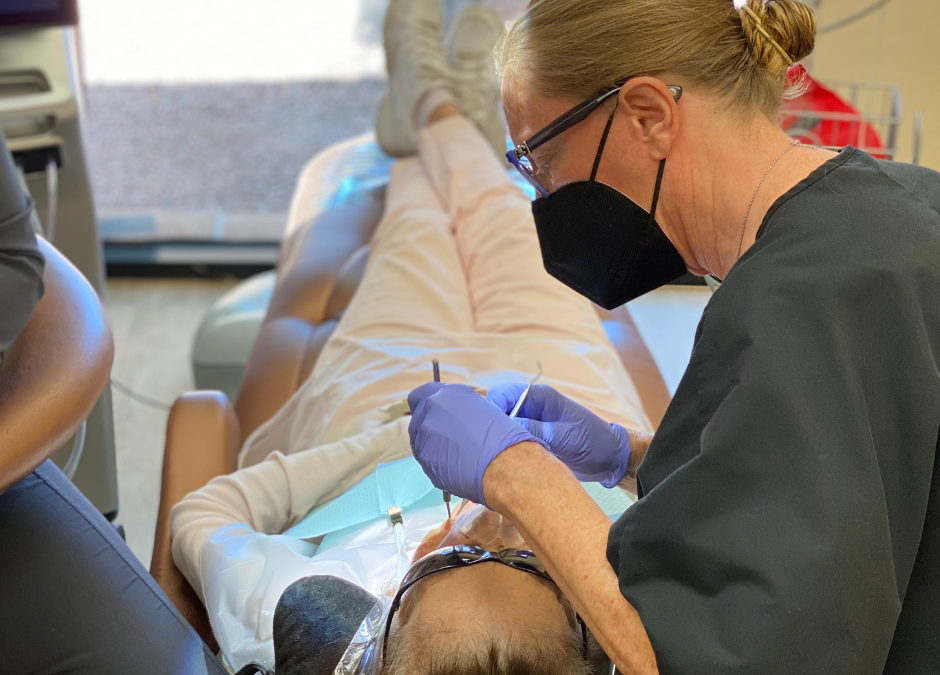
by Dr. Jacqueline S. Allen | Jun 19, 2023 | Blog, Endodontics, Endodontist, Root Canal
Time is precious. That’s why, even when a natural tooth needs saving through a root canal procedure, we typically want to know how much time we’ll need to commit to the endodontist. Depending on the condition of your tooth, which tooth is getting the root canal, and a host of other factors, the amount of time needed for the root canal can vary considerably.
Here’s a brief look at some things that can impact the time required for your root canal – including care before and after the procedure itself.
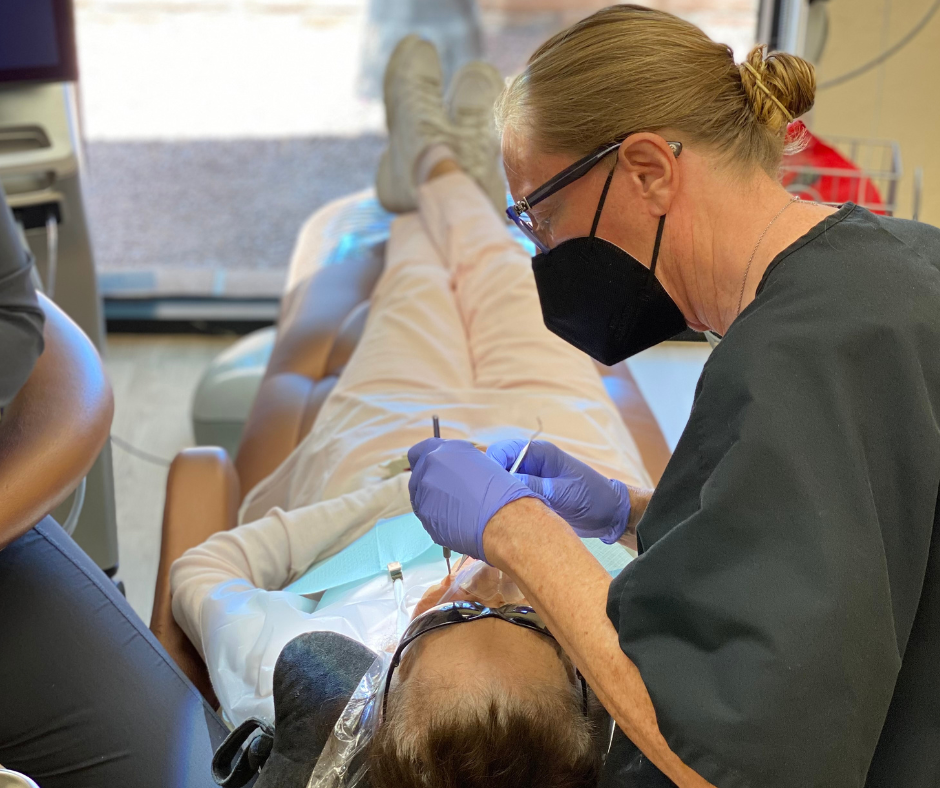
Factors That Impact How Long A Root Canal Procedure Takes
1. The preliminary examination before your root canal procedure. This appointment is needed to confirm the diagnosis and help your endodontist plan your treatment.
2. You may need antibiotic treatment before your treatment. If your tooth is badly infected, you’ll need to complete a course of antibiotics before your root canal. This can delay your appointment or make the treatment itself more complicated.
3. Before the root canal itself, your endodontist will prepare your tooth. Before the actual cleaning of the tooth roots, your endodontist will have the area around the impacted tooth numbed with local anesthesia. Then a dental dam – a small sheet of latex or another material – will be placed to isolate the tooth and keep the area clean.
4. Root canal treatment itself can take anywhere from 30 to 90 minutes. This includes cleaning the root canals, flushing them with a disinfecting agent, and placing a temporary filling. Teeth with multiple roots may take longer.
5. After the root canal treatment, you’ll need to schedule a follow-up appointment to place a permanent restoration. To provide extra protection from reinfection or additional damage, a crown is the necessary final step in the root canal process. It’s important to get a crown placed quickly to protect against new infection and ensure the root canal treatment succeeds.
“At our practice, we understand our patients have busy lives, so we provide an estimate of how long their root canal should take, from start to finish,” says Dr. Jacqueline S. Allen, who practices at the Phoenix Endodontic Group. “We welcome questions about our time estimates and any additional steps they may want to take at home before or after the procedure.”
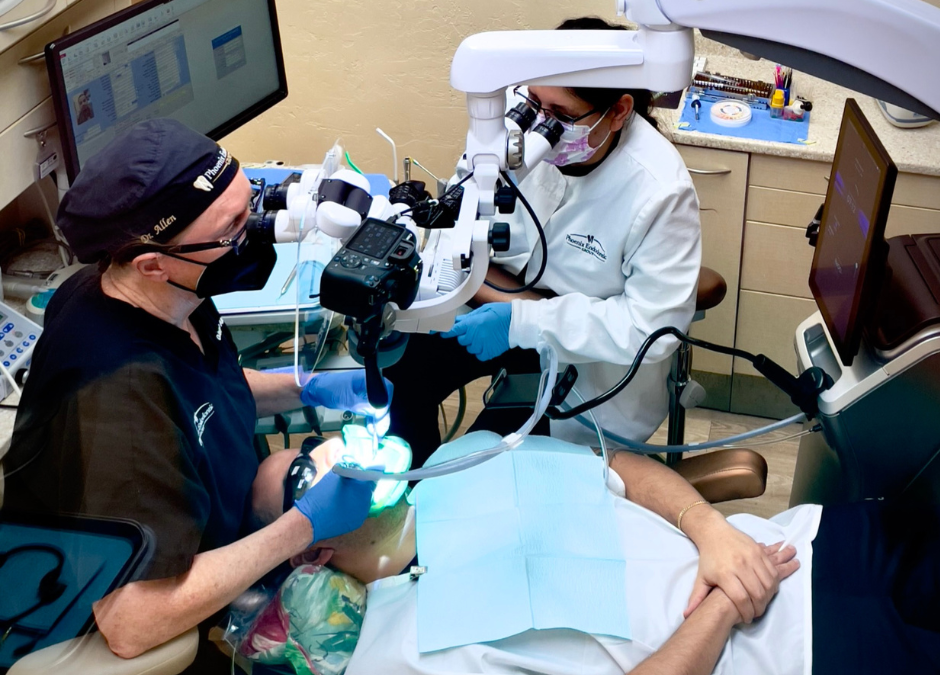
by Dr. Jacqueline S. Allen | May 10, 2023 | Blog, Endodontics, Endodontist, Save Your Tooth Month
Recent years have brought amazing advances in dental care. Veneers, crowns, and even dental implants are available to restore or replace many functions of natural teeth. Perhaps the most important advances of all relate to saving natural teeth, allowing you to use them for your entire lifetime.
The American Association of Endodontists (AAE) designates May as its “Worth Saving” public awareness month. This awareness campaign highlights the role that endodontists, who are highly trained dental specialists, play in saving natural teeth through root canal treatments and other techniques.
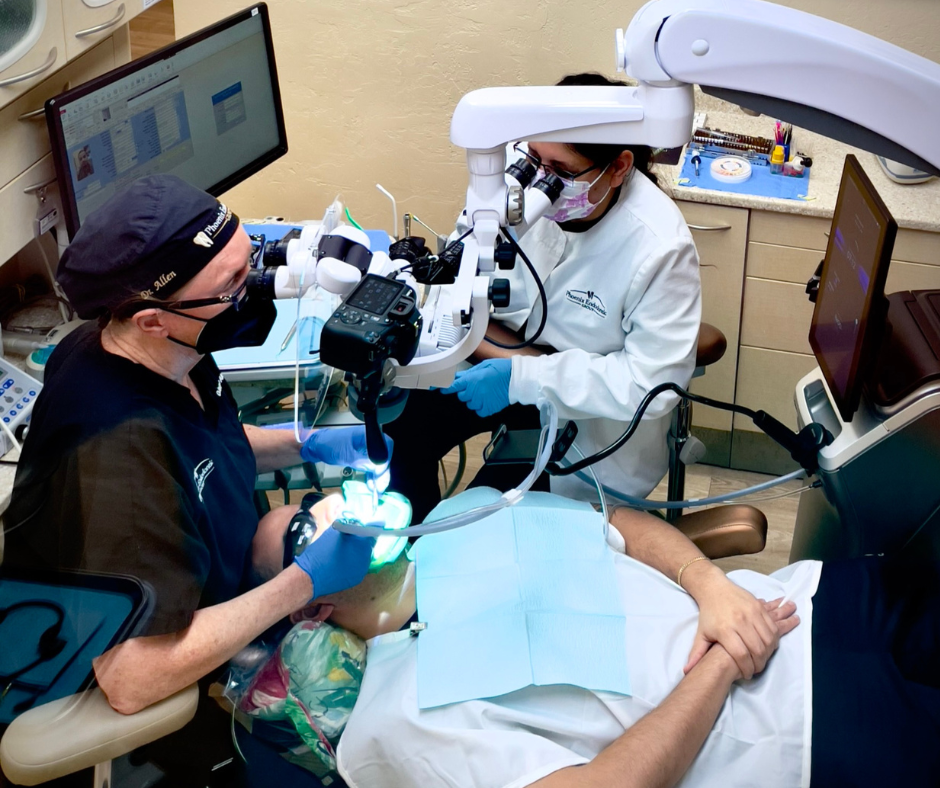
Reasons Natural Teeth Are Worth Saving
Given the replacement or restoration options dental professionals have when a natural tooth is compromised by decay or injury, why do endodontists work so hard to save your teeth?
1. Most people want to save their natural teeth. In a survey sponsored by AAE, 95 percent of respondents said it is important to save their natural teeth. In fact, nearly a quarter of Millennials (born 1980-1996) said saving their natural teeth is their top concern about saving or restoring their body.
2. Natural teeth have benefits that artificial restorations cannot mimic. Natural teeth have connections to the gum tissue around them through the periodontal ligament and an epithelial attachment. These connections help teeth adapt to changes when chewing or talking and also help sustain gum health. Dental implants lack these connections.
3. Treatments to save teeth are less invasive. A root canal treatment has less impact on your mouth than an extraction or implant. Your post-procedure pain and recovery time is also lessened.
4. Root canal treatments are often overall less costly. Teeth extraction by itself is not expensive, but implants can cost thousands, even if only one or a few teeth need replacement.
5. Treatments to save natural teeth are more cost effective. A 2009 British study determined that for a tooth that could be saved with a root canal treatment or a re-treatment of a previous root canal, the lifetime costs of endodontic treatment were equal or less than replacing it with an implant.
“Our natural teeth are designed to last a lifetime, and they can last a lifetime, with proper care and the assistance of endodontists if a tooth is badly infected or injured,” says Dr. Jacqueline S. Allen, who practices with the Phoenix Endodontic Group. “Our staff welcomes you to discuss your case with us. We’re happy to help you experience the benefits of saving your natural teeth.”
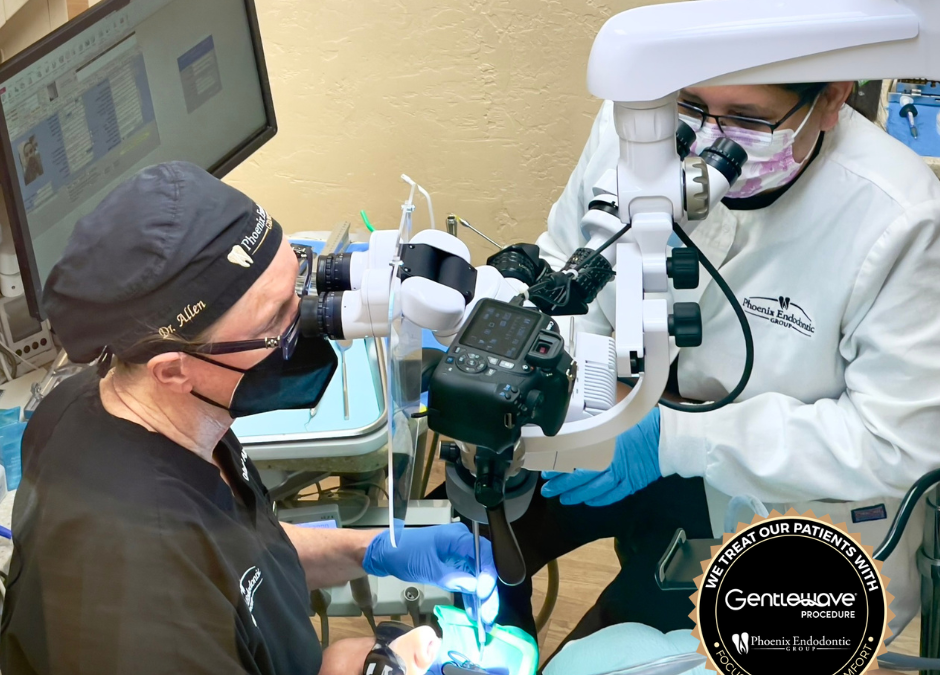
by Dr. Jacqueline S. Allen | Mar 21, 2023 | Blog, Endodontics, Endodontist, Phoenix Endodontic Group, Root Canal
Pain sends many patients to the dentist. This is certainly the case when it comes to patients who need root canals. However, not feeling pain does not mean you don’t need a root canal.
Root canals are an endodontic technique to preserve natural teeth that have irreversible pulpitis, an infection of the nerve pulp of a tooth not able to be treated successfully. This condition can result from severe decay or an injury to the tooth. Often there is pain, but not always.
Here are a few important reasons to look beyond pain to discover whether your tooth needs a root canal treatment.
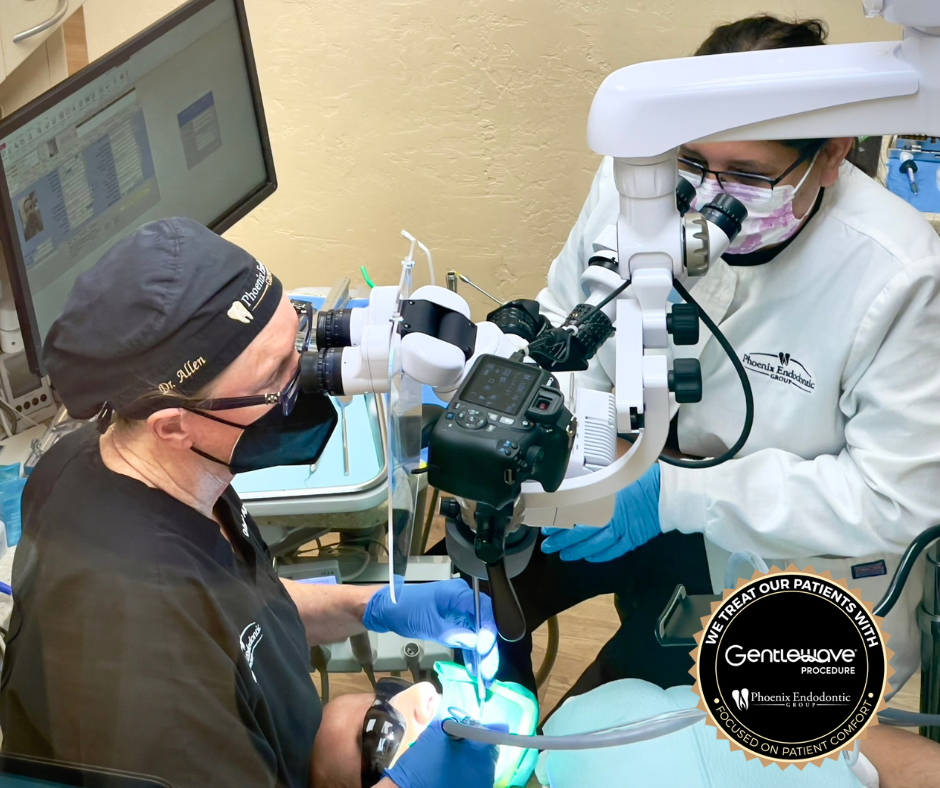
Looking Beyond Pain – Root Canal Treatment
-
Your endodontist is looking for infection as the cause of your troubles, not pain. Inflammation in the tooth’s nerve pulp is the cause the endodontist is looking for. Pain can accompany inflammation, but it is not a reliable guide to diagnosis.
-
Pain is only one symptom of needing a root canal. Other symptoms include teeth that are sensitive to heat or cold, swelling of the face or gums, or teeth that become gray or discolored.
-
Your infection may be draining, perhaps temporarily reducing pain, but also pouring foul toxins into your mouth. A pimple on the gum, called a fistula, or other types of pus drainage from the tooth are also symptoms of pulpitis. These conditions may temporarily reduce your pain, but the tooth will still need treatment: a root canal.
-
Pain associated with inflamed nerve pulp can be inconsistent. If your dentist puts you on an antibiotic to deal with an infected tooth, your pain may be relieved. Your pain may go away on its own, but this might be because the nerves in your tooth have died – not because the tooth is healthy again. Some patients who require root canals report “positional pain,” pain that emerges only when they sit up, lay down, or run in place.
“Determining whether a patient needs a root canal can be complex, and pain is only one factor considered in an evaluation,” says Dr. Jacqueline S. Allen, who practices with the Phoenix Endodontic Group. “Regular checkups with your general dentist and referrals to endodontic specialists as needed are the most reliable way to know if your natural teeth need a root canal to save them.”




 We had a Q&A with Janeth:
We had a Q&A with Janeth: 






